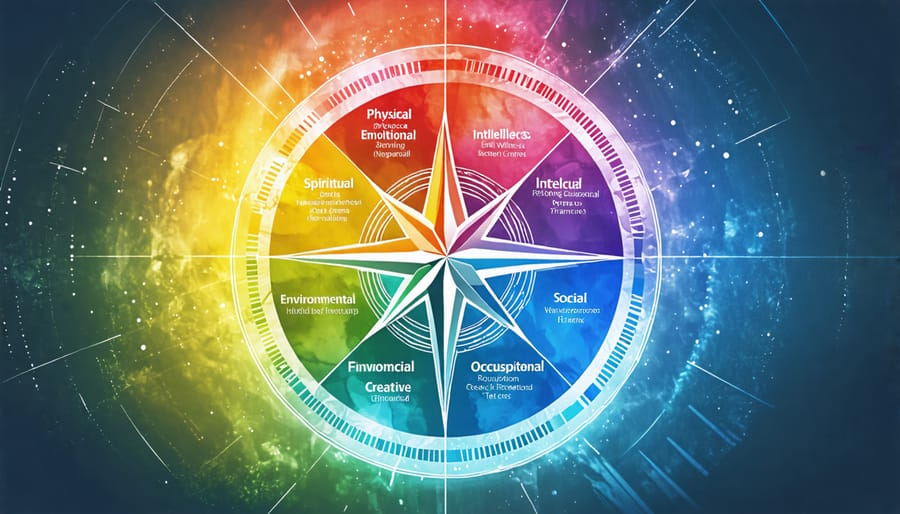
9 Essential Dimensions of Wellness for a Balanced, Thriving Life
Unlock optimal well-being by nurturing nine interconnected dimensions of wellness. Physical, emotional, spiritual, intellectual, social, environmental, occupational, financial, and creative wellness form the foundation of a balanced, fulfilling life. By mindfully tending to each facet – from nourishing your body with wholesome foods to cultivating meaningful relationships and aligning your work with your values – you create a harmonious ecosystem that allows you to thrive. Embracing this multidimensional approach empowers you to make intentional choices, build resilience, and find joy in the journey of personal growth. Discover the transformative power of holistic wellness as you embark on a path of self-discovery, healing, and vitality. By honoring the intricate tapestry of your being, you unlock your innate potential and create a life that radiates with purpose, passion, and authentic well-being.
Physical Wellness
Physical wellness involves taking care of your body through regular exercise, balanced nutrition, sufficient sleep, and preventive healthcare measures. Engaging in physical activity for at least 30 minutes a day can help maintain a healthy weight, reduce the risk of chronic diseases, and improve overall mood and energy levels. Eating a balanced diet rich in fruits, vegetables, whole grains, and lean proteins provides the essential nutrients your body needs to function optimally. Adequate sleep, typically 7-9 hours per night for adults, is crucial for physical and mental recovery, as well as maintaining a strong immune system. Preventive healthcare, such as regular check-ups, screenings, and vaccinations, can help detect and address potential health issues early on. By prioritizing these aspects of physical wellness, you can build a strong foundation for overall well-being and improve your quality of life. Remember, small changes in your daily routine, such as taking the stairs instead of the elevator or choosing healthier snack options, can make a significant difference in your physical wellness journey.

Emotional Wellness
Emotional wellness involves understanding and managing your feelings in healthy, constructive ways. It’s about developing emotional intelligence – the ability to recognize and regulate your own emotions while being attuned to the feelings of others. Stress management is a key component, as chronic stress can take a heavy toll on emotional well-being. Building resilience helps you bounce back from setbacks and adapt to change with greater ease. Consistent self-care practices, like engaging in hobbies, spending time with loved ones, and making space for relaxation, can support emotional balance. Seeking support when needed, whether from friends, family, or mental health professionals, is also an important aspect of nurturing emotional wellness. By cultivating self-awareness, healthy coping mechanisms, and strong support systems, you lay the foundation for greater emotional stability and overall well-being.

Intellectual Wellness
Intellectual wellness involves nurturing a curious, open mind and continuously seeking opportunities to learn and grow. Engaging in mentally stimulating activities, such as reading, solving puzzles, or exploring new hobbies, can help keep your brain sharp and expand your knowledge. Cultivating critical thinking skills allows you to analyze information, make informed decisions, and solve problems more effectively. Creativity is another key aspect of intellectual wellness, enabling you to express yourself, generate innovative ideas, and approach challenges from fresh perspectives. To support intellectual wellness in your workspace, aim to create a quality office environment that encourages focus and minimizes distractions. Incorporate ergonomic essentials to promote comfort and productivity, and consider adding personal touches that inspire creativity, such as artwork or plants. A serene workspace can help you maintain clarity of thought and tackle mentally demanding tasks with greater ease. By prioritizing lifelong learning, embracing new experiences, and nurturing your creative side, you can enhance your intellectual wellness and lead a more fulfilling, well-rounded life.
Social Wellness
Social wellness involves developing and maintaining positive relationships with others, building strong communication skills, and actively engaging in your community. Nurturing supportive connections with family, friends, and colleagues can provide a sense of belonging, reduce stress, and improve overall well-being. To enhance social wellness, practice active listening, express yourself clearly and respectfully, and be open to others’ perspectives. Seek out opportunities to connect with like-minded individuals through shared interests, hobbies, or volunteer work. Participating in community events, joining clubs or organizations, and contributing your time and skills to local causes can foster a sense of purpose and connection. Remember that building and maintaining relationships requires effort and commitment, but the benefits of a strong social support system are invaluable. By prioritizing social wellness, you can create a network of positive, supportive relationships that enrich your life and contribute to your overall sense of well-being.

Spiritual Wellness
Spiritual wellness involves exploring your life’s purpose, values, and beliefs to gain a deeper understanding of yourself and your place in the world. It’s about cultivating mindfulness, practicing self-reflection, and engaging in activities that nurture your spirit. Whether through prayer, meditation, or connecting with nature, finding ways to foster inner peace and a sense of meaning can significantly impact your overall well-being.
Taking time for introspection and contemplation can help you align your actions with your core values and live a more authentic life. Engaging in practices like journaling, yoga, or spending quiet time in solitude can provide opportunities for self-discovery and personal growth. Spiritual wellness also involves developing compassion, empathy, and a deep appreciation for the interconnectedness of all living things.
Nurturing your spirit can bring a greater sense of balance, resilience, and fulfillment to your life. It can help you navigate challenges with grace, find joy in the present moment, and cultivate a more positive outlook. By prioritizing spiritual wellness, you invest in your own personal development and create a foundation for a more meaningful and purposeful existence.
Environmental Wellness
Connecting with the natural world and being mindful of your environmental impact are key to environmental wellness. Immersing yourself in nature, whether through hikes, gardening, or simply spending time outdoors, can boost your mood, reduce stress, and foster a sense of inner peace. At the same time, making sustainable choices in your daily life, such as conserving resources, reducing waste, and supporting eco-friendly products, contributes to a healthier planet.
Your surroundings also play a significant role in your well-being. Creating a living space that is clean, organized, and filled with elements that bring you joy can greatly improve your mental and physical health. Incorporating plants, natural light, and soothing colors into your home or workspace can promote relaxation and productivity. Additionally, engaging in eco-friendly DIY projects not only enhances your environment but also gives you a sense of accomplishment and purpose.
By nurturing your connection to nature and making environmentally conscious decisions, you can cultivate a deeper appreciation for the world around you and contribute to a more sustainable future. Remember, small changes in your daily habits can have a significant impact on your personal well-being and the health of our planet.
Occupational Wellness
Occupational wellness involves finding fulfillment and maintaining a healthy work-life balance through your chosen career or vocation. Engaging in work that aligns with your values, interests, and skills can contribute significantly to your overall sense of well-being. To achieve occupational wellness, it’s essential to create a supportive work environment that promotes growth, recognition, and a sense of purpose.
Maintaining clear boundaries between work and personal life is crucial for preventing burnout and ensuring that you have sufficient time for self-care, relationships, and leisure activities. Regular communication with your employer or colleagues can help establish realistic expectations and foster a positive, collaborative atmosphere.
Continuously learning and developing new skills related to your occupation can boost your confidence, adaptability, and job satisfaction. Embracing challenges and seeking opportunities for professional development can help you stay engaged and motivated in your work.
Remember that occupational wellness is not just about your paid job; it also encompasses any volunteer work, hobbies, or educational pursuits that contribute to your sense of purpose and fulfillment. By actively nurturing your occupational wellness, you can enhance your overall quality of life and find greater meaning in your daily activities.
Financial Wellness
Financial wellness involves making smart decisions about budgeting, saving, investing, and managing your money to reduce financial stress and build long-term security. Start by creating a budget that tracks your income and expenses, helping you identify areas where you can cut back and allocate more towards savings and investing. Aim to build an emergency fund that covers 3-6 months of living expenses, providing a safety net for unexpected events. When it comes to investing, consider a diversified portfolio that aligns with your risk tolerance and financial goals. This may include a mix of stocks, bonds, mutual funds, and real estate. Regularly review your financial situation and adjust your plan as needed. Seek guidance from a financial advisor if you need help navigating complex financial decisions. Remember, small changes in your spending and saving habits can add up over time, contributing to greater financial stability and peace of mind. By taking control of your finances and making informed decisions, you’ll be better equipped to handle life’s challenges and pursue your long-term goals with confidence.
Conclusion
In conclusion, nurturing all nine dimensions of wellness is essential for achieving optimal health, happiness, and life satisfaction. By taking a holistic approach that addresses your physical, mental, emotional, spiritual, social, environmental, occupational, intellectual, and financial well-being, you can create a balanced and fulfilling life. Start by assessing your current state in each dimension and identifying areas that need improvement. Set realistic goals, prioritize self-care, and engage in activities that support your overall well-being. Remember, small steps can lead to significant changes over time. Be patient with yourself, celebrate your progress, and don’t hesitate to seek support when needed. By making a commitment to your multidimensional wellness, you’ll be on the path to unlocking your full potential and living your best life.
